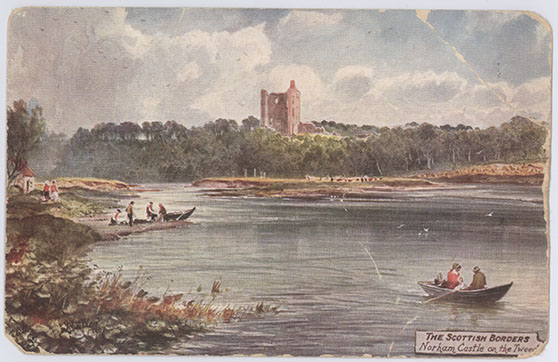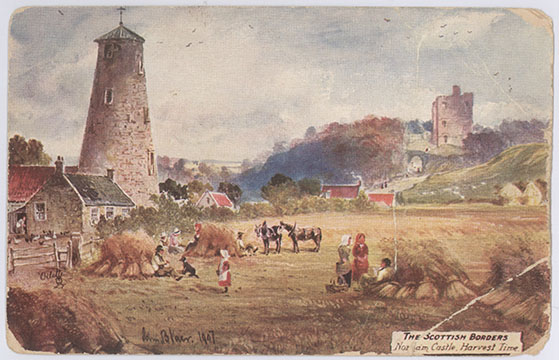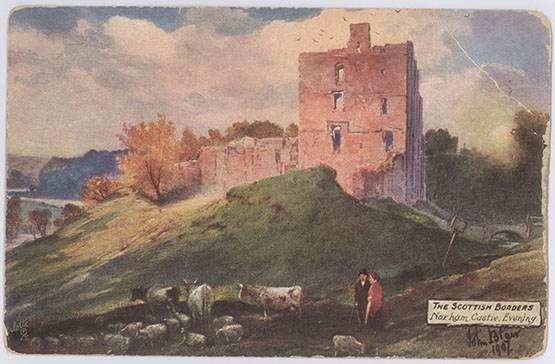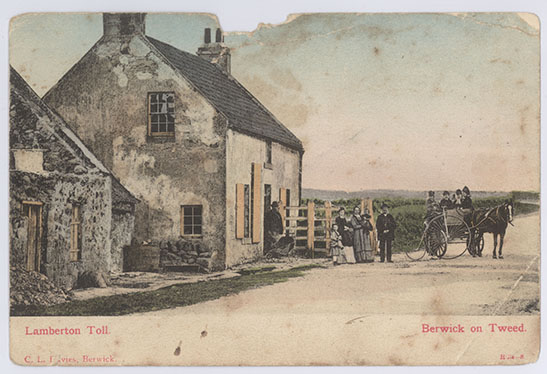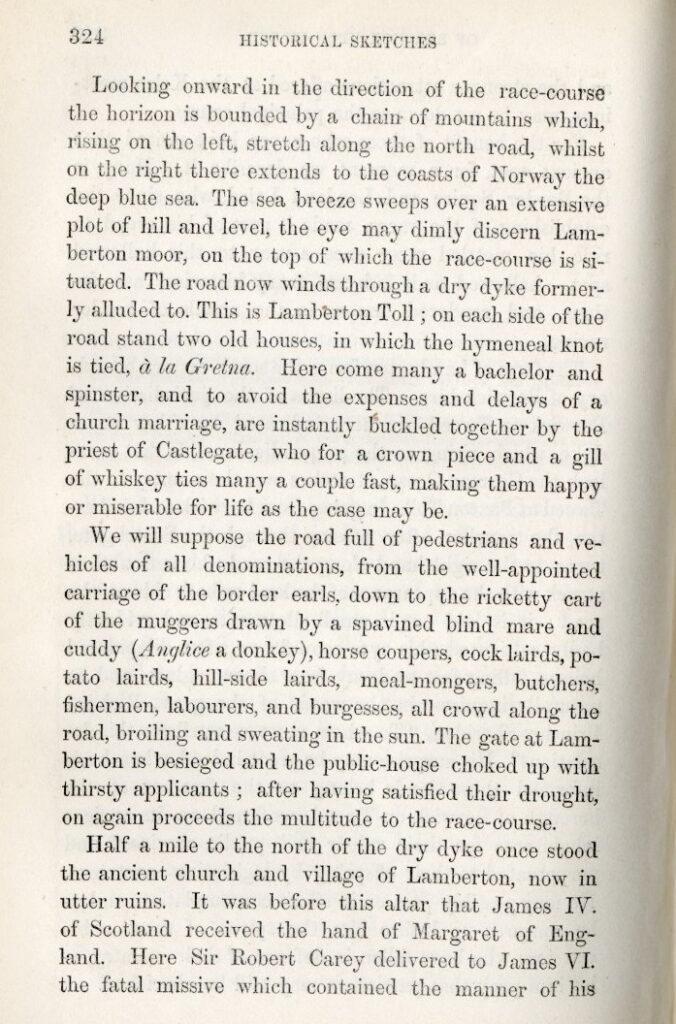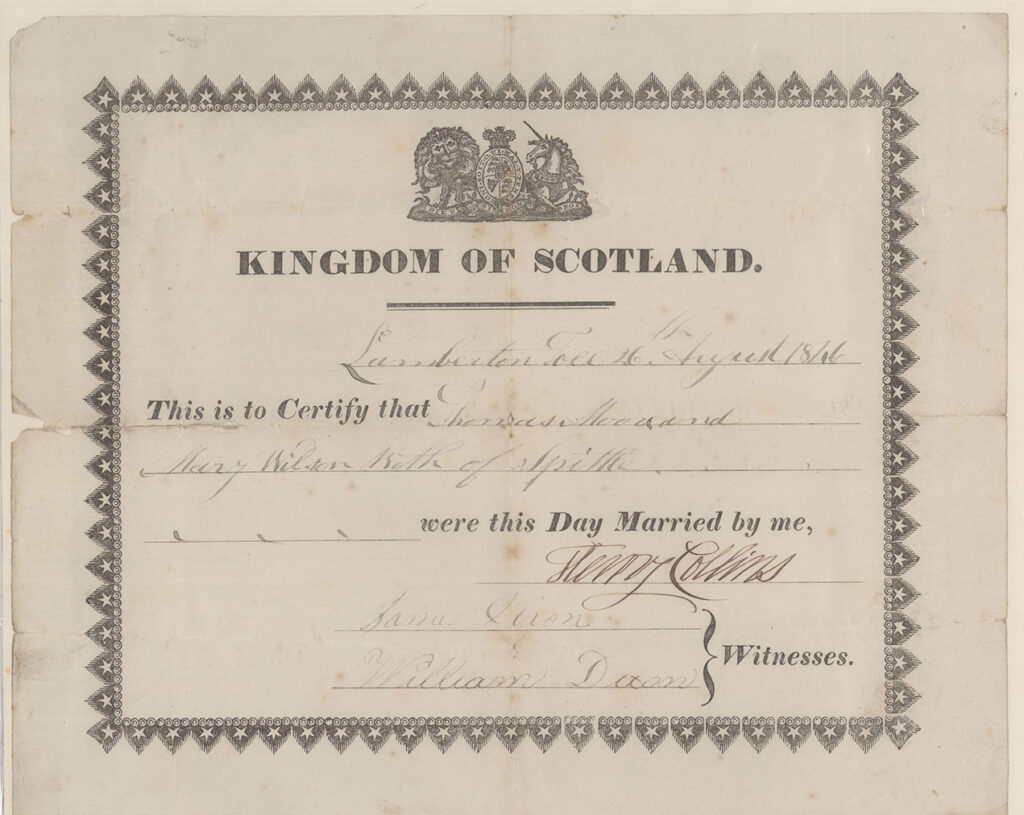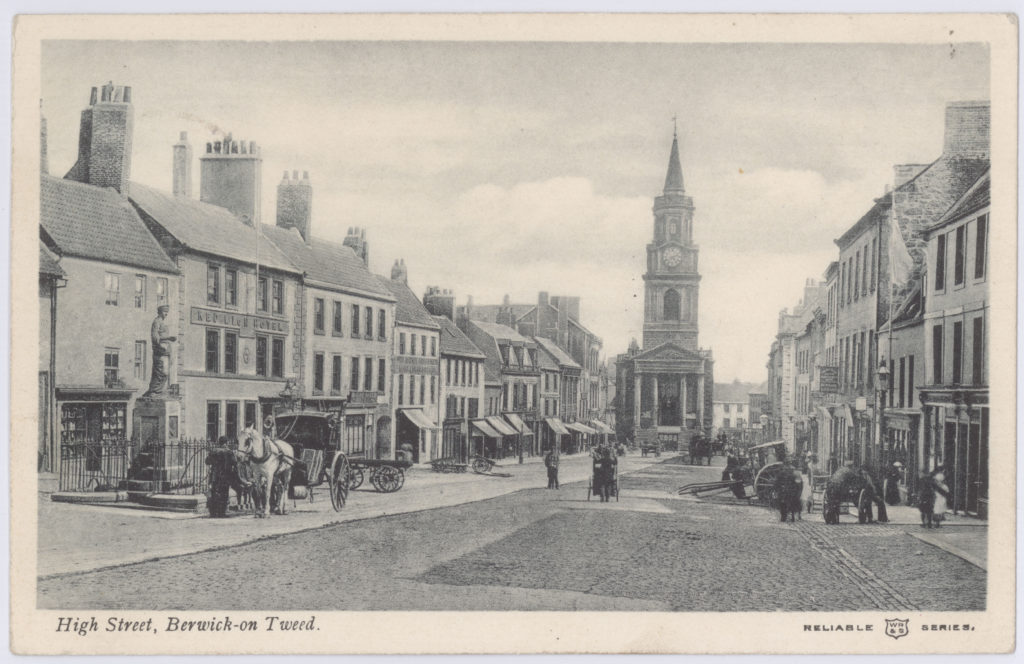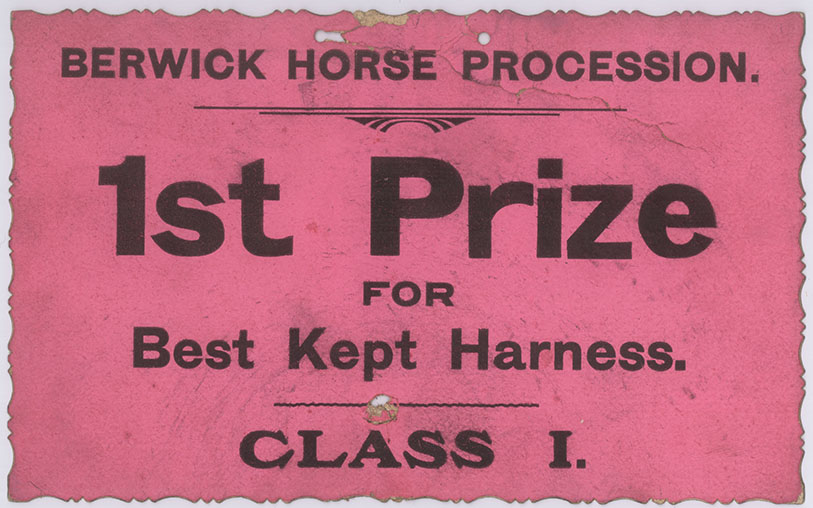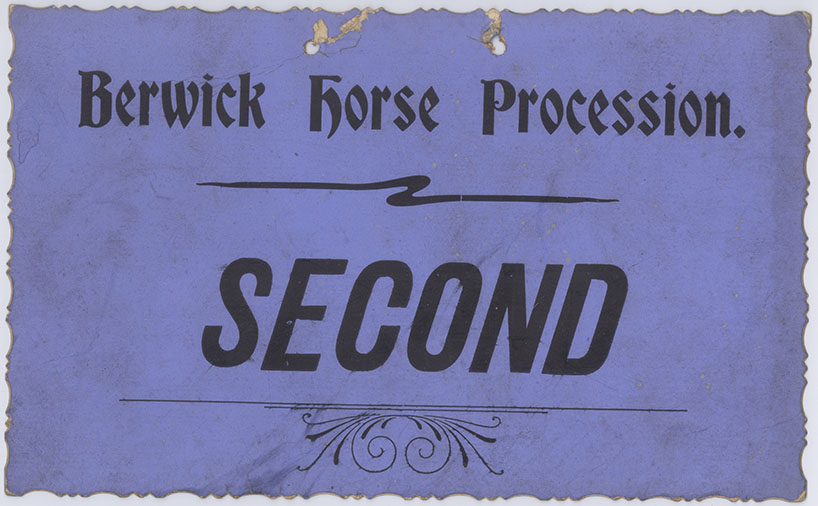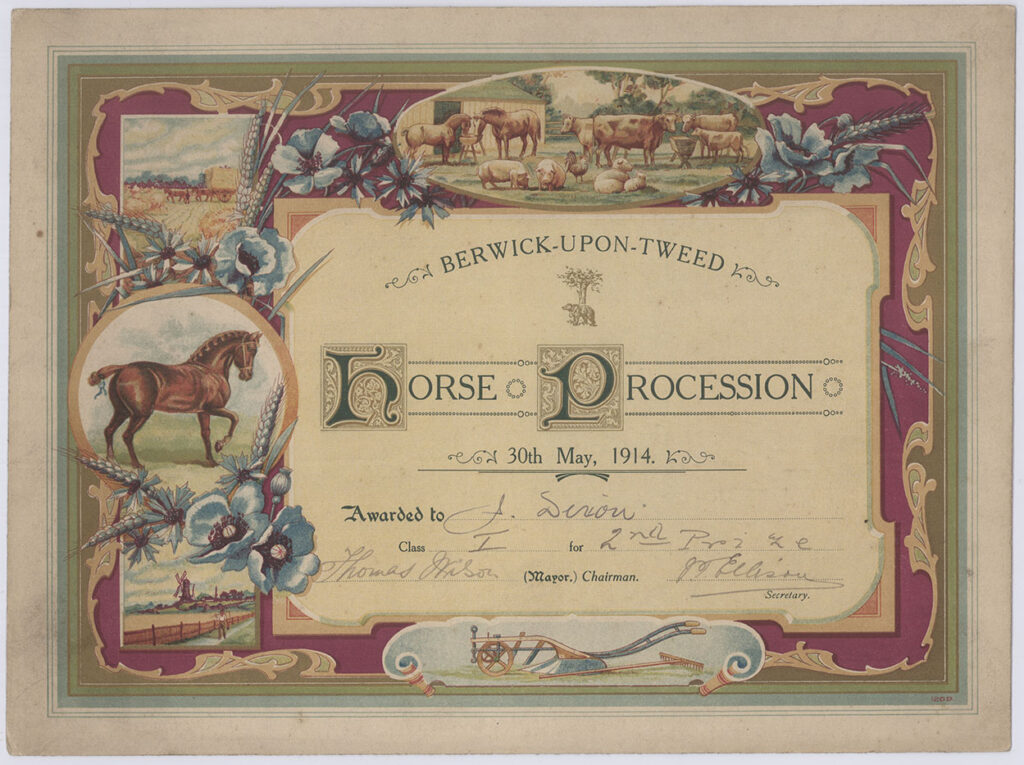NORHAM CASTLE HISTORY
At the annual summer outing of the Melrose Literary Society to Norham, the following paper on the position of Norham Castle in history and romance prepared by Mr J. E. Fairbairn was read in his absence by Mrs Drummond:-
The habit of this Society in selecting for its annual outing some place famous in literary annals has on this occasion again been amply justified and maintained, for today we meet mot only on the scene of one of the greatest and most stirring poems in the whole range of English literature, but on the banks of that river which had been such a fruitful source of inspiration for many a poet’s fancy. Throughout his life there was no river which appealed to Scott like the ever dear Tweed: he knew it in every aspect, it was his joy to ride its most dangerous fords, to light its dark waters at night with the flame of the salmon lusterer, or to dream beneath a tree above its flowing waters, and on that memorable afternoon to the music of its ripple he fell asleep. It was only natural therefore that he should have selected the castled steep of Norham, flanked by the fine sweep of the river as the scene of his fresh and galloping poem of Marmion. Did it ever occur to you how I each of his three best known poems Scott weaves his story round some hoary castle on a romantic river bank. In “The Day” it is Newark and Yarrow, in “Marmion” Norham and Tweed, and in the “Lady of the Lake” the final scene occurs in Stirling on the Forth. Most of “Marmion” was composed on horseback, and the cantos ring with the sound of hoof and the jingling of bridle and spur. The preparation for the writing of “Marmion” began with his childhood’s years round the old tower of Smailholm when the love of martial tales was so early implanted in his breast and never ceased to grow until it reached its full maturity. While Scott found the inspiration of the poem in the old story of the feuds between the two Kingdoms with all its accompanying throng of gallant knights and ladies fair, he wove into the still older tale of love between man and maid, and it contains also a fine outburst of enthusiasm for his native city of Dunedin.
Norham, as you can see, has been something more than an ordinary Border peel tower, and in the height of its glory must have been a place of great dimensions. With its double moat and strong fortifications, it looks as if it would be almost impregnable against attack, while its high and massive walls, even in their decay, are grim and forbidding and suggest defiance to all. This great fortress, set down as it were to over awe a Kingdom, was begun by Ralph Flambard, Bishop of Durham, in 1121, and was completed about 1170 under the succeeding Bishop, Hugh Pudsey, reminding us that in these early days the ecclesiastics, while members of the Church militant, took part also in another form of warfare. Its purpose was to ward off the turbulent and aggressive Scot of the North and was the great Border fortress in charge of the warlike Bishop of Durham. The river in broad volume washes on two sides of the high rock on which it stood in all its grandeur. Within the inner wall stood the massive square keep or donjon of Flambard Pudsey’s days, originally 95 feet in height, and still as a ruin not much less. Norham was the last point to the north of the province of Northumberland, and it eyed the opposite heights of Ladykirk and the Scottish Border with perfectly equipped defiance, and commands even today a view of the distant Lammermuirs to the north, and the triple peaks of the Eildons to the west. Round it cluster important movements in English and Scottish history from the time of King John to James IV. At the head of the island in the river is the ford where James was nearly carried away, and where he made the vow that issued in the building of Ladykirk. The importance of Norham ceased with the union of the Crowns in 1603, when its last Governor, Sir Robert Cary, rode from London to Holyrood in two days to hail James VI. as Monarch of two Kingdoms. It still frowns across the Merse and carries us in thought back to the days of chivalry when the holding of its great sandstone keep was a gage of knightly honour.
Though day set long ago on the living glory of its castled steep the fame of the deeds done there in ancient days is not likely to be forgotten. Its walls still ooze history, and thanks to the genius of a master hand it rises again in all its ancient glory so that its denizens of former times become to us a living presence. Looking on its broken battlements as they yellow in the western blaze we are seeing it in that same golden glory under which Marmion sought its walls. In our mind’s eye we can still see that errant knight in all his panoply and pride come riding o’er the hill. We can still hear the steady tread of the warder on the turret high, and across the calm air of the evening there comes to us a snatch of that ancient Border gathering song. The form of the witching lady Ford still flits across the scene, bearing heavy on her soul the fate of Flodden Field, and with the wail for the Flowers o’ the Forest causing unrest to her spirit. The doughty King James, directing the destinies of battle looms large on Piper’s Hill, and under burden of a mental and more grievous weight than his ponderous iron belt. It is a far cry from Norham to the Scottish capital, but there still comes to us the news of battle ringing down its cobbled streets, and we see the haggard form of Randolph on his weary steed, the sole survivor of that mighty host which but a week before had gathered on the Burgh muir. It is pictures like these and many others that the once proud but now dismantled towers of Norham suggest and conjure up before us. The waters which wash its walls have flowed through a hundred scenes famous in history, renowned in romance, and garlanded with song, past many a roofless Border peel, and before the river loses itself in the bosom of the eternal sea it lingers for a while round this the last of the landmarks on her hundred miles of water way. Norham carries us back to the days of chivalry, and few castles of that period display more of their strength than this stronghold not only so, but that quality also shone, though in a fitful and a fading gleam across the ridge of Flodden.
The massive ruin still keeps ward upon the Border side, and Castle and Church and village alike are full of reminiscences of history and romance. Hither in 1318 there came from Lincoln an actual Sir Wm. Marmion, helmed with gold, it is said, under pledge to win his lady love by defending Norham for a year and day. Alas, h however, for the gallant, for the Scots Borderers proved too warlike for him, and he lost his gage, his lady and his life in a single ambuscade. Here in May, 1291, Edward I met the Wardens of Scotland to arrange the succession to the Scottish crown, and thus sowed the seeds of the dire wars of Succession in the northern Kingdom. And it was on the green meadows opposite that in June of the same year the great nobles of Scotland, took upon the gospels, the oath of allegiance to the English King. But these and other actual historical events sink into comparative insignificance with the romantic episodes associated with Norham. In the Abbotsford gallery of fame the haughty crest of Marmion and the abiding love of Clare occupy honoured and important niches, and it is round them that there has been woven that story of glamour and romance which will enshroud the castled steep of Norham until the last day has set upon its battlements and towers.

